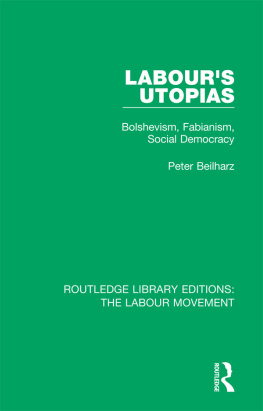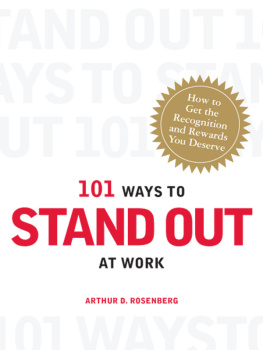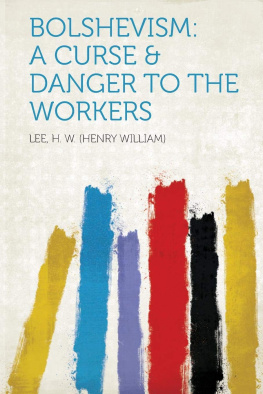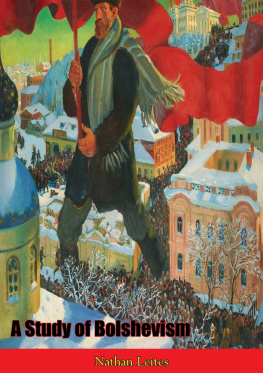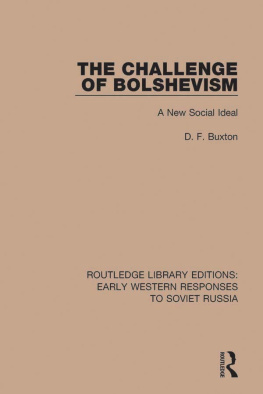Arthur Rosenberg - A History of Bolshevism: From Marx to the First Five-Year Plan
Here you can read online Arthur Rosenberg - A History of Bolshevism: From Marx to the First Five-Year Plan full text of the book (entire story) in english for free. Download pdf and epub, get meaning, cover and reviews about this ebook. year: 1932, genre: Politics. Description of the work, (preface) as well as reviews are available. Best literature library LitArk.com created for fans of good reading and offers a wide selection of genres:
Romance novel
Science fiction
Adventure
Detective
Science
History
Home and family
Prose
Art
Politics
Computer
Non-fiction
Religion
Business
Children
Humor
Choose a favorite category and find really read worthwhile books. Enjoy immersion in the world of imagination, feel the emotions of the characters or learn something new for yourself, make an fascinating discovery.

- Book:A History of Bolshevism: From Marx to the First Five-Year Plan
- Author:
- Genre:
- Year:1932
- Rating:3 / 5
- Favourites:Add to favourites
- Your mark:
- 60
- 1
- 2
- 3
- 4
- 5
A History of Bolshevism: From Marx to the First Five-Year Plan: summary, description and annotation
We offer to read an annotation, description, summary or preface (depends on what the author of the book "A History of Bolshevism: From Marx to the First Five-Year Plan" wrote himself). If you haven't found the necessary information about the book — write in the comments, we will try to find it.
A History of Bolshevism: From Marx to the First Five-Year Plan — read online for free the complete book (whole text) full work
Below is the text of the book, divided by pages. System saving the place of the last page read, allows you to conveniently read the book "A History of Bolshevism: From Marx to the First Five-Year Plan" online for free, without having to search again every time where you left off. Put a bookmark, and you can go to the page where you finished reading at any time.
Font size:
Interval:
Bookmark:
This translation of the original German edition of my Geschichte des Bolschewismus (published in 1932) is an exact rendering and does not contain any alteration of any kind whatsoever. Events that have occurred since the appearance of the German edition fully confirm the views expressed in these pages. The collapse of the KPD without any show of resistance proved that the Communism of the Third International could no longer be looked upon as a living revolutionary force. The ruin of the KPD sealed the fate of the Third International, which has ceased, together with its affiliations in Czechoslovakia, France, etc, to be a factor in international politics. Moreover, the attitude displayed by the Soviet government towards Hitlerite Germany shows that Stalin is no longer interested in the so-called world revolution. The Soviet government did not in its negotiations with Nazi Germany allow itself to be actuated by any other consideration than that of self-interest, and displayed no regard whatever for the German Communists or the Communist International. Stalin thus indirectly proclaimed the dissolution of the Third International as an independent and active labour movement. In Soviet Russia the course followed by events has been that indicated in the original German edition. At the same time the Soviet government has revealed itself powerless to resolve the glaring contradictions in its governmental system.
Arthur Rosenberg
Zrich, August 1933
An immense literature exists on the subject of Soviet Russia and the Russian Revolution -- documented and journalistic, scientific and sentimental, condemnatory and adulatory. This book does not attempt to compete with what has already been written and instead seeks to fill a definite gap. Up to the present there has not been available any history of the evolution of Bolshevism from its roots in Karl Marx through the individual stages traversed by Lenin, down to the theories and tactics of Stalin in 1932. It has thus come about that false notions are common in the widest circles on the subject of Bolshevism. It is either underestimated or overestimated and never appreciated for what it really is.
Ideas are the products of actual conditions and not of a vacuum. It is therefore necessary here to take note of the factors in the development both of Russia and the world in so far as they are essential for a proper understanding of Bolshevism. It would have been beyond the scope of this book to have attempted to describe fully any one event in the Russian Revolution or -- for example -- to analyse the Five-Year Plan in detail.
The problem which I have attempted to solve in this book is scientific and not a problem of party politics. At the time of the split in the Independent Social-Democrat Party in Germany in 1920 I joined the Communist Party in common with the majority of the USPD. I was for years a member of the Berlin Committee, the Central Committee of the KPD, and the Executive of the Third International. I was forced to resign from the Communist International in 1927, as so many Communists of all countries have been forced to do before and since. Since then I have not belonged to any political party nor to any of the small groups comprising the Communist Opposition. I have not written this book to please any party or group, and I am not conscious of any desire to make 'revelations' or to 'settle accounts'. Those who hope to find in this book anecdotes about Stalin and the 'torture chambers' of the GPU will be bitterly disappointed.
It is obviously necessary for scientific and political reasons to remove the problem of Bolshevik Russia from the atmosphere of petty strife and political debate. It will be shown that important issues depend upon our judgement of Bolshevik Russia, such as German-Russian relations, proletarian unity, and the relations between Russia and the international proletariat. It must be clearly understood that despite everything that has happened, Soviet Russia is progressing and the Third International is irretrievably heading towards destruction. This book seeks to explain how this unique twofold situation has arisen.
As far as possible I have used Bolshevik sources. At the same time I have not hesitated to state my own opinions. I have throughout avoided giving this book an autobiographical character which would have been unsuitable for the task I had in view. Among German literature on Bolshevism I am specially indebted to the works of Karl Korsch.
Arthur Rosenberg
Berlin-Zehlendorf, June 1932
While on a journey in Holland in March 1843, the twenty-five-year-old Dr Karl Marx wrote to his friend Rugge [sic; hereafter Ruge - RT] a letter in which he described the follies of Frederick William IV of Prussia. He added:
The state is too serious a concern to be turned into a harlequinade. It is possible that a ship manned by idiots might run before the storm for a time. Its fate would nevertheless overtake it if for no other reason than that the idiots would not realise it. In our case this doom is the revolution that is at our doors.
This trumpet-blast was answered by Ruge in a mood of deep pessimism:
Although it is a hard saying, I must write it because it is the truth. I cannot imagine any nation that is so disunited as the German nation. You see workmen -- and not men; thinkers -- and not men; masters and servants, young people and those who are already settled in life, but not men. Is that not a battlefield where arms and legs and mutilated bodies lie heaped on one another while the life-blood runs out upon the ground? Hlderlin in Hyperion. That describes my mood; and unfortunately it is not a new one. The same cleavage works at different ages in the same manner in all humanity. Your letter is filled with illusory ideas. Your courage only serves to intensify my lack of spirit. You say that we -- the contemporaries of these Germans -- are going to experience a political revolution? Your wish is father to your thought, my friend. Oh, I have lived through it all! Hope is sweet and disappointment bitter, very bitter. It takes more courage to despair than to hope. Nevertheless, it is the courage of common sense, and we have reached the point at which we dare not let ourselves be disappointed any longer.
Ruge went on to add:
In so far as one can speak of a German spirit, it is contemptible, and it gives me no qualms of conscience to declare that it is owing to its contemptible nature that it appears as it does.
He concluded his letter with the words:
Our nation has no future. What does our reputation matter?
Marx refused to be discouraged. He agreed indeed with Ruge that a Germany of shopkeepers and fools could not be the scene of a revolution like the French or English revolutions. But in the eyes of Marx that only meant that a revolution in Germany must take on a special character; it must be no revolution of half-measures but must revolutionise the entire structure of society in a single effort. And Marx formulated his theory as to the nature of the coming revolution in Germany in his celebrated 'Criticism of Hegel's Philosophy of Law' which appeared in 1844 in the Deutsch-Franzsische Jahrbcher. This review bore on its title-page the names of its two editors -- Arnold Ruge and Karl Marx. Hence Marx's article was also a tirade against the pessimism of his co-editor.
In this article Marx asked the question:
Can Germany accomplish a revolution that will not only raise it to the level of a modern nation but also to the pinnacle that will be attained in the immediate future by the other nations?
Font size:
Interval:
Bookmark:
Similar books «A History of Bolshevism: From Marx to the First Five-Year Plan»
Look at similar books to A History of Bolshevism: From Marx to the First Five-Year Plan. We have selected literature similar in name and meaning in the hope of providing readers with more options to find new, interesting, not yet read works.
Discussion, reviews of the book A History of Bolshevism: From Marx to the First Five-Year Plan and just readers' own opinions. Leave your comments, write what you think about the work, its meaning or the main characters. Specify what exactly you liked and what you didn't like, and why you think so.


